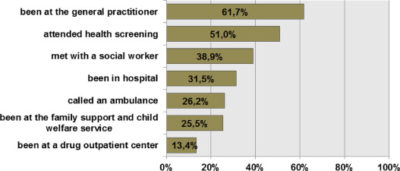New psychoactive substance (NPS) use has become a widespread phenomenon among marginalized communities in Hungary. The authors collected data in marginalized communities in villages in two regions in Hungary, where 150 questionnaires were recorded and 50 interviews were conducted with current NPS users. The research was conducted in isolated rural communities, where people have poor labour market positions, low educational background and live in socially marginalized groups. When analyzing the data, most themes in the interviews were associated with surviving stress, crisis and anxiety, as well as the wish to escape from insecurity and chaotic life. Positive experiences of NPS use were present only in a handful of interviews, though euphoria was never mentioned in the narratives.

“NPS users have to overcome serious obstacles in order to access adequate health care services.”, said dr. József Rácz, professor and head of the Department of Addictology of Semmelweis University.
A high proportion of the respondents respondents seek direct help by calling an ambulance, which indicates a lack of prevention services and substance use-related intervention in these areas. Intervention related to the substance use of people living in these communities cannot focus exclusively on drug use; the long run it can only be addressed effectively with interventions aiming at social and environmental factors.
New psychoactive substance use as a survival strategy in rural marginalised communities in Hungary
Róbert Csák, Judit Szécsi, Sziliva Kassai, Ferenc Márványkövi, József Rácz (2020).
International Journal of Drug Policy, Volume 85.
https://doi.org/10.1016/j.drugpo.2019.102639


